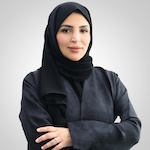University of Doha for Science & Technology, Doha, Qatar | December 03-05, 2024


keynote speakers
Click on a picture to view talk abstract.

Gordon Cheng, Ph.D., IEEE Fellow |

James Won-Ki Hong, Ph.D |

Ms. Duha Al Buhendi |

Raghav Thalabhakthula |
Title: Human-Centered Machine Intelligence for Future Society |
|
|
Dr. Gordon Cheng
Fellow IEEE Professor and Coordinator Center of Competence Neuro-Engineering in ECE Department Technical University Munich, Germany |
|
|
Abstract:
In this talk, I present a human-centered neuroscience-based approach that enables the realization of complete intelligent systems designed to be deployed across several domains. My approach involved the fusion of neuroscience and robotics, targeting improving people's quality of life. I will specifically show several examples, including safe human-robot interaction, whole-body humanoid- robot interaction, enhanced humanoid locomotion, robot navigation among movable objects, robot- robot collaboration, and locomotion control of bipedal exoskeleton (to restore walking for the disabled). |

Dr. Gordon Cheng |
|
Speaker Biography:
Gordon Cheng has made pioneering contributions in Humanoid Robotics, Neuroengineering, and Artificial Intelligence for over 20 years. Since 2010, he has held the Chair Professor for Cognitive Systems and the Director of the Institute for Cognitive Systems at the Technical University of Munich, Germany. Prof. Cheng is the Program Director of the Elite Master of Science in Neuroengineering of the Elite Network of Bavaria, a highly selective and unique study program in Germany. He is also the coordinator of the Center of Competence Neuro-Engineering. Gordon Cheng is the co-inventor of 20 patents and has co-authored over 450 technical publications, proceedings, editorials, books, and book chapters. The IEEE acknowledged this interdisciplinarity when he was named IEEE Fellow in 2017 for his “contributions in humanoid robotic systems and neurorobotics.” His research interests include NeuroRobotics, Humanoid Robotics, Imitation Learning, Cognitive Systems, Artificial Intelligence and NeuroEngineering. www.ce.cit.tum.de/ics | |
Title: AI-Driven Innovations: Leveraging Large Language Models for Network Management, Spine Pain Detection, and Academic Excellence |
|
|
Dr. James Won-Ki Hong
Professor, Dept. of Computer Science and Engineering Dir. Distributed Processing & Networks Management Lab Pohang University of Science and Technology (POSTECH), Korea |
|
|
Abstract:
In this keynote, we explore the transformative potential of Artificial Intelligence, particularly Large Language Models (LLMs), across diverse domains such as network management, medical diagnostics, and academic peer review. We delve into how LLMs are revolutionizing network management by detecting faults in network devices and virtual network functions, and automating virtual network configurations. In healthcare, we examine their role in detecting causes of spine pain through advanced pattern recognition and data analysis. Finally, we discuss the application of LLMs in technical paper reviewing, where they assist in ensuring quality, originality, and relevance in academic research. |

Dr. James Won-Ki Hong |
|
Speaker Biography:
James Won-Ki Hong is Professor in the Dept. of Computer Science and Engineering (http://cse.postech.ac.kr), Director of Center for Crypto Blockchain Research (http://ccbr.postech.ac.kr), and Director of Distributed Processing and Network Management Lab (http://dpnm.postech.ac.kr/) at POSTECH, Pohang, Korea. James worked as CTO and Senior Executive Vice President for KT from March 2012 to Feb. 2014, where he was responsible for leading the R&D effort of KT and its 50 subsidiary companies, and where he initiated R&D on SDN (Software-Defined Networking). He was Chairman of National Intelligence Communication Enterprise Association, and Chairman of Telecommunications Technology Association (TTA) Standardization Board in Korea. He was a co-founder and Executive Director of SDN/NFV Forum from Oct. 2014 to May 2019 in Korea (https://www.sdnnfv.org/). He is a co-founder and chief technical advisor of Kedutech, a Korean startup developing and providing video conferencing service called Vmeeting (https://vmeeting.io). He was co-founder and CTO of Netstech, a Palo Alto, USA-based startup developing network integrated ultra-dense, blade servers from 2000 to 2002. His research interests include blockchain & cryptocurrency, AI-based network management, SDN and NFV, and LLM-based applications. Over the past 30 years, James has been an active volunteer in various committees in IEEE, ComSoc, and KICS. He has served as Steering Committee Chair of IEEE ICBC, NOMS, IM, NetSoft, APNOMS and CNSM as well as Chair of CNOM and KNOM. He has also been serving as Editor-in-Chief of Wiley’s International Journal of Network Management (IJNM, https://onlinelibrary.wiley.com/journal/10991190) as well as an editorial board member of IEEE TNSM, JNSM and JCN. He is General Co-Chair of IEEE ICBC 2025 (http://icbc2025.ieee-icbc.org/). He was General Chair of IEEE NOMS 2024 (http://noms2024.ieee-noms.org), NetSoft 2016 (http://sites.ieee.org/netsoft-2016/), IEEE ICBC 2019 (http://icbc2019.ieee-icbc.org/), IEEE NOMS 2018 (http://noms2018.ieee-noms.org) and 2018 IEEE Blockchain Summit Korea. James received his HBSc and MSc degrees in Computer Science from the University of Western Ontario, Canada in 1983 and 1985, respectively, and the PhD degree in Computer Science from the University of Waterloo, Canada in 1991. | |
Title: Emerging Technologies and Workforce Disruptions: Bridging the Skill Gaps in Qatar |
|
|
Ms. Duha Al Buhendi
Ministry of Communication and IT State of Qatar |
|
|
Abstract:
Duha Ali Al-Buhendi, Digital Society and Digital Competencies Director at Qatar’s Ministry of Communications and Information Technology, will explore the transformative impact of emerging technologies, particularly artificial intelligence (AI), on Qatar’s workforce. Her presentation will review the current job distribution across sectors in Qatar and project future shifts driven by AI, Cloud Computing, Robotics, and Blockchain. A significant focus will be on the growing skills mismatch, where an increasing demand for highly skilled professionals contrasts with an oversupply of lower-skilled workers. |

Ms. Duha Al Buhendi |
| To address this challenge, Duha will outline how MCIT’s Qatar Digital Academy (QDA) is collaborating with leading course providers to revamp its training offerings. These updates are designed to align with the evolving technological landscape, ensuring the Qatari workforce is equipped for the future. By expanding its reach to both public and private sector employees, QDA aims to provide critical skills in areas such as AI. This initiative is set to expand further by 2025, targeting an even broader audience and fostering a more resilient and future-ready workforce. | |
|
Speaker Biography:
Ms. Duha Al Buhendi is an expert in the field of digital transformation and entrepreneurship, currently serving as the Director of the Digital Society and Digital Competencies Department at the Ministry of Communication and Information Technology (MCIT) in Qatar. With a diverse background spanning business administration, telecommunications, and innovation, Duha has been instrumental in driving Qatar's digital agenda forward. Duha's journey into the realm of technology began after she graduated with a bachelor's degree in Business Administration with a major in Economics in 2005. Her passion for understanding the dynamics of markets and industries led her to join ictQATAR that same year, where she started as a Competition Analysis Specialist under the Telecommunications Regulatory Authority. In this role, she developed a deep understanding of the telecommunications landscape and its regulatory frameworks. Eager to explore new avenues within the technology sector, Duha transitioned to market development at ictQATAR, where she played a pivotal role in fostering innovation and growth in Qatar's digital ecosystem. Her dedication and strategic vision led to her involvement in the establishment of Qatar's first incubation center for digital entrepreneurship in 2011 under the Ministry of Information and Communication Technology. While managing the digital incubation center, Duha pursued further education, undertaking a study at Qatar University from 2015 to 2017. During this time, she expanded her knowledge and expertise in the field of digital entrepreneurship, laying the groundwork for her future endeavors. In 2017, Duha graduated with an MBA, focusing on innovation and entrepreneurship, further solidifying her credentials as a leader in the digital space. Armed with a robust academic background and years of hands-on experience, she continued to make significant strides in Qatar's technology sector. In 2022, Duha's exemplary track record and dedication to advancing digital competencies earned her the esteemed position of Director of the Digital Society and Digital Competencies Department at MCIT. In this role, she leads initiatives aimed at enhancing digital literacy, fostering innovation, and ensuring that Qatar's citizens are equipped with the necessary skills to thrive in the digital age. Beyond her work in the public sector, Duha is also the founder of Cien Estilos, a Qatari brand dedicated to bringing luxury fashion to the local market. Her entrepreneurial spirit and commitment to innovation extend beyond her professional endeavors, reflecting her multifaceted approach to driving positive change in society. As a visionary leader, entrepreneur, and advocate for digital empowerment, Duha Al Buhendi continues to inspire and shape Qatar's digital future, leaving an indelible mark on the nation's technological landscape. | |
Title: Role of AI in Smart Cities |
|
|
Raghav Thalabhakthula
CISCO |
|
|
|

Raghav Thalabhakthula |
|
Speaker Biography:
Customer Delivery Advisor at Cisco Systems, with over 21 years of experience and currently involved in strategizing and designing innovative digital services and platforms for public sector customers across the ME region. Possesses subject matter expertise across smart cities, smart buildings, mobility, sustainability, AI, and digital oilfields, along with hands-on experience in using communication technologies and integration methods. Major accomplishments include winning and delivering large-scale, complex digital consulting projects across different verticals and industries, including smart cities. | |
invited speakers:

Dr. Mohammad Shahidehpour
Fellow IEEE
Bodine Chair Professor and Director
Galvin Center for Electricity Innovation,
Illinois Institute of Technology
Title: Generative Artificial Intelligence Applications in Smart Grids




 conference program
conference program


